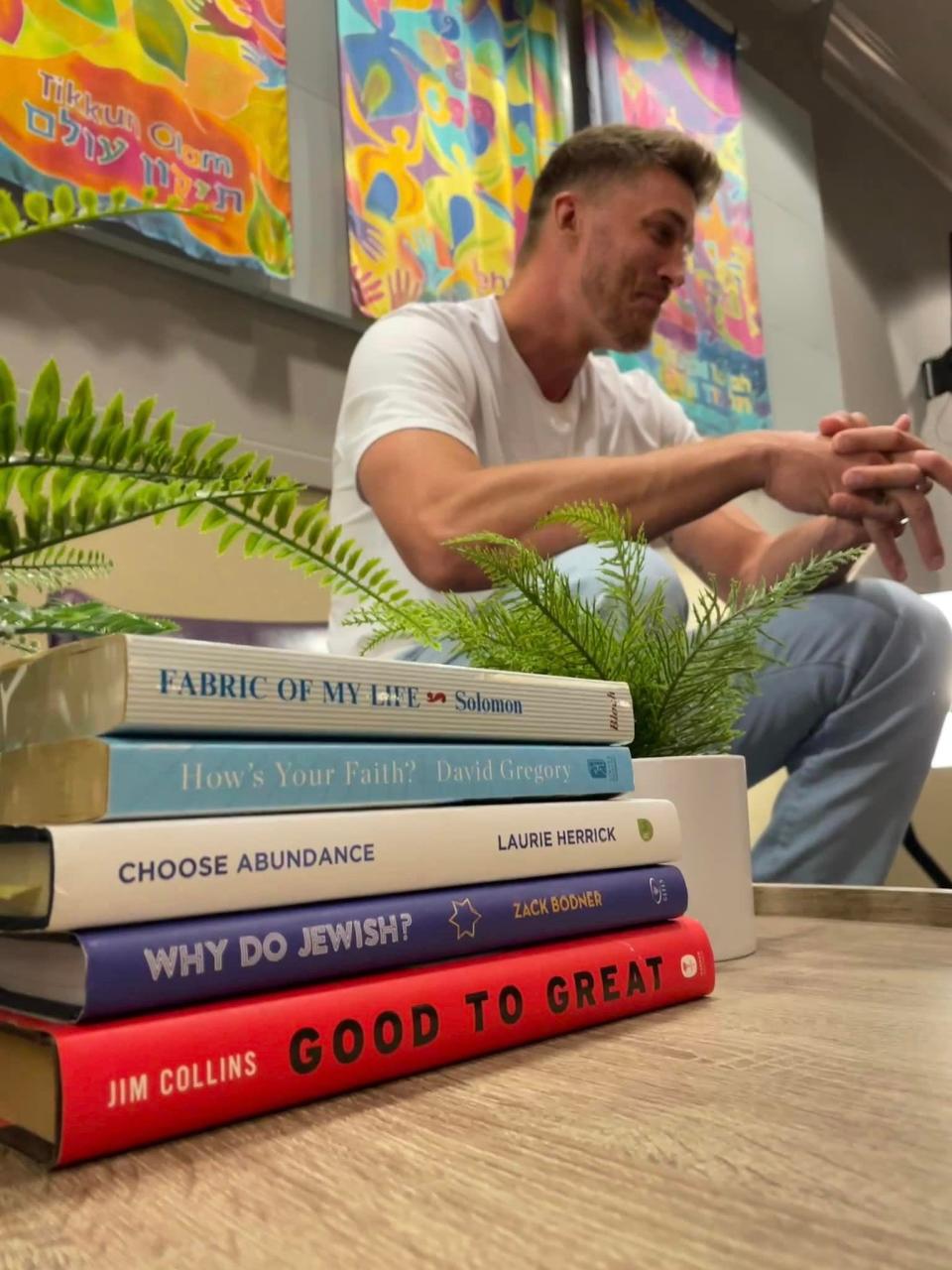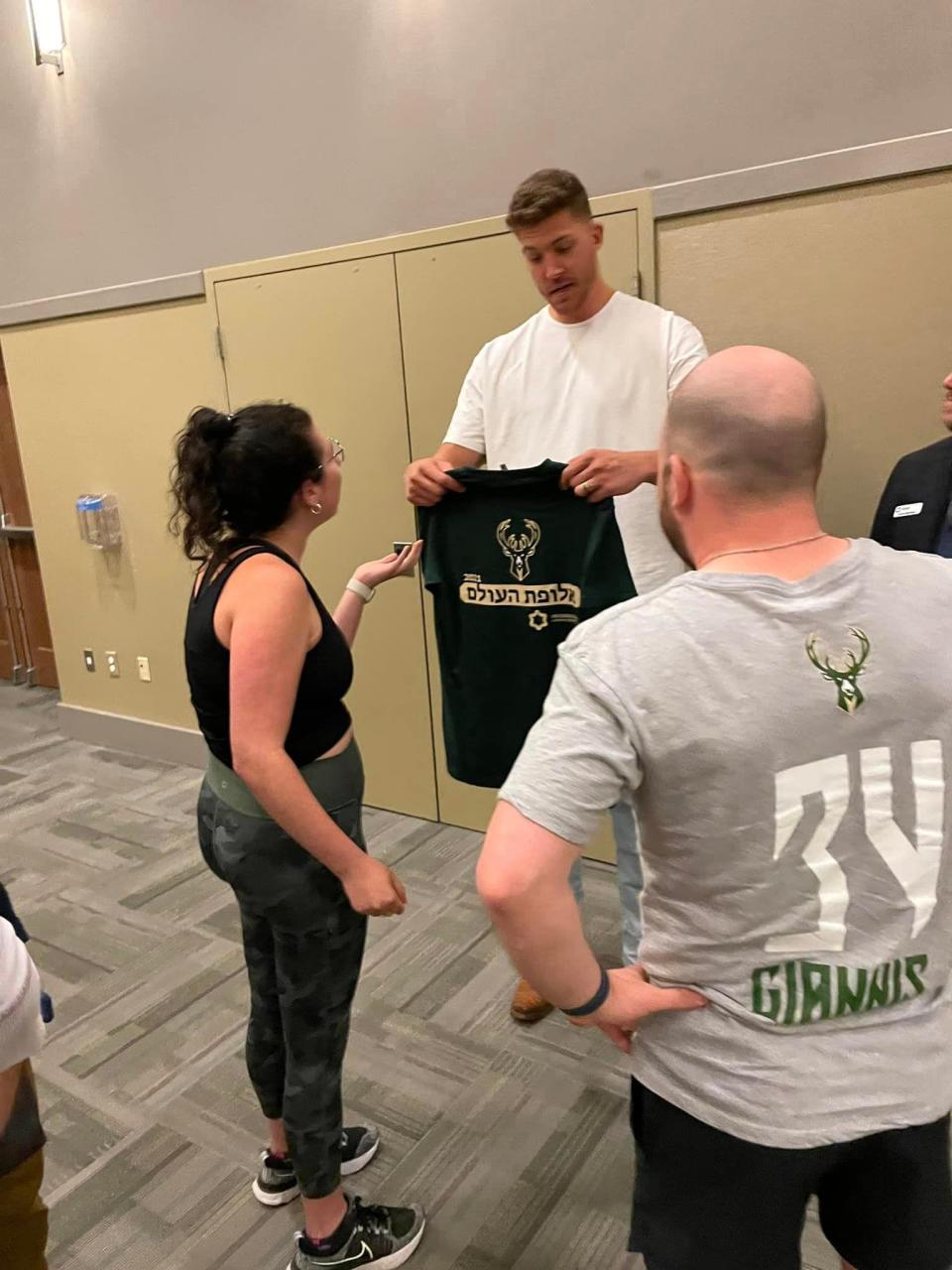On a path to forgiveness: Milwaukee Bucks' Meyers Leonard trying to atone for antisemitic slur
Meyers Leonard said he was sorry countless times to a very engaged audience that had gathered recently at the Jewish Community Center at his request.
He apologized several times in the 15-minute news conference beforehand.
And he kept saying he was sorry after the event when talking to people individually.
Two years ago, Leonard, an NBA veteran who was on the Miami Heat roster at the time, was playing “Call of Duty” with other online gamers on Twitch when he let out a string of expletives, including an antisemitic slur.
Leonard says he didn’t know the meaning and history behind the word. But, he said, when he was made aware of it soon after, he went on an immediate quest to apologize for what he did with members of Jewish communities throughout the country.
And he’s been seemingly apologizing ever since.
Leonard is in Milwaukee now; in February, the Bucks became the first team to sign him after a two-year hiatus from the NBA, when he was dealing with multiple injuries. But, he admits, his damaged reputation likely did not help his NBA career.

Grateful for another chance, and settling into Milwaukee at least for a few months, Leonard reached out to the JCC in Whitefish Bay to see if he could speak to interested members and non-members. Mark Shapiro, president and CEO of the JCC, readily agreed.
Leonard already had long-ago dealt with his $50,000 fine, week-long suspension and consequential trade out of Miami after he said the offensive word. He reached out to the JCC in his continued quest to reclaim his credibility and share his remorse.
The JCC leadership saw an opportunity with a bigger picture in mind – to move on from a mistake to discussing hate speak overall, which has become almost regular headline news, and to offer advice and perspective on historical and cultural identities.
“I was proud of the JCC. We lived every word of our mission statement that night,” Shapiro said. “I was proud of Meyers because that is not an easy choice (to meet with the audience). Living in a cancel culture, there's so much risk in admitting that you've done something wrong. It's almost like you're programmed to try and deny it because one wrong move and your whole life could be over."
According to Anti-Defamation League statistics, 56% of all religious hate crimes are targeted at Jewish people. Jewish people make up 2.4% of the U.S. population.
Shapiro added that it was a blessing to get Leonard, who happens to be a basketball player, who happens to stick out in a crowd at 7-foot-2, willing to have that conversation, willing to own a mistake and then open up a conversation that starts with antisemitism.
"I think that hate against one is hate against all," Shapiro said. "Well, then, we've got to be willing to tackle all of it."
As Leonard lingered at the JCC that night, greeting everyone personally until he was the last man to leave the building after three hours, it became abundantly clear there were even more opportunities here for all of us to consider.
What can someone who did something hurtful learn from the aftermath?
After he said the ugly word, Leonard said he and his wife received death and other alarming threats on social media.
Scared for her safety, Leonard asked his wife to return to Illinois while he met with rabbis and members of various Jewish communities through a network of friends and supporters within days after the incident. His agent helped. The NBA offered suggestions. Leaders from Jewish communities from Toronto to Miami and all over the U.S. stepped up. Leonard’s response: "I'm so sorry. Will you please help me?"
It didn't appear to be a publicity stunt − but it also wasn’t enough to quell the online vitriol. Leonard felt overwhelmed at first and then severely depressed. He said he considered suicide.
"And I don't say that lightly,” he said. “It was really rough."
While Leonard sought opinions and guidance, including from friends he didn’t even know were Jewish, he also realized his need for therapy to deal with emotional pain from childhood. Diagnosed with social anxiety and depression, Leonard chose to deal with a whole lot more than his mistake.
There are no silver linings, but Leonard’s experience with online hate taught him a lesson in empathy. He knows it is not an equal comparison, but the hate he experienced made him realize to some degree the terror someone from the Jewish community – and anyone really – who experiences hatred feels.
"I now at least have some idea of what it possibly feels like to be attacked," Leonard said. "Now − I made a mistake. They're just living. Mark (Shapiro) – just living as a man who is a Jew is attacked because of that."
Because of this, Leonard has vowed to be an ally. Really all that means is that if Leonard hears someone use a slur, he will speak up: "Hey, do you know that what you’re saying could be hurtful to someone?"
Can we forgive those who apologize?
Celebrities and athletes such as musician Lizzo, former Brewers pitcher Josh Hader and former Green Bay Packers receiver Devin Funchess have used offensive language that has hurt people. And they have apologized.
Can we accept the lessons learned? Can we differentiate, as best as we can, between apologies and, for example, NBA star Kyrie Irving and his refusal to admit he was retweeting propaganda that was awful?
“DeSean Jackson did pretty horrific things; he went with Julian Edelman to tour the U.S. Holocaust Museum. And that was it," Shapiro said.
"Meyers has been giving, and giving and prostrating himself and falling on the sword for two years and he has not backed down. He doesn't have to do another thing."

Shapiro noted that during the event no one dared say the slur that Leonard used.
“I don't believe we're going to be able to really make a difference in hate speak if we're going to keep avoiding saying the word,” Shapiro said. “We all live in fear. If the word comes out of my mouth, and somebody doesn't understand the context … now I've said that word.
“But there's something for us all to learn about the power that we give hate speak when we're not willing to even acknowledge what the word itself actually is.
“Kike comes from a Yiddish word kikel, which translates to circle. When the Jews arrived at Ellis Island, they didn't write in English; they wrote with Hebrew letters. So when they had to sign their name, the officers at Ellis Island said, just put down an X. But Jews see the X as the cross, so Jews put a circle, or a kikel.
“And it somehow became a slang and a slur. The whole word becomes so much less powerful when we actually understand where it comes from what it was.”
Is it Meyers Leonard's responsibility to do more?
Members of the audience were eager to connect with Leonard, offering their forgiveness and suggestions, and even books to read. It was a collaborative event more than confrontational. But Leonard was asked how to reach the people who weren't offended by what he said. And, even deeper, how to reconcile with people like Holocaust deniers.
That feels like a question with an impossible answer. And yet Leonard seems open to exploring the conversations that might lead to some level of allyship at least.
“I believe I can help him move on from this conversation just being about the antisemitic slur, but about the lessons that he learned of hate speak in general,” Shapiro said. “How are we ever going to get a Holocaust denier to change their mind? I agree with you; it's a very limited opportunity.”
More: Sidney Dobner is promoted to become the first female assistant coach for the Milwaukee Bucks
More: Bucks center Brook Lopez wins Bob Lanier Community Assist Award for literacy initiatives
Instead, the JCC continues to reach out and serve its local community, with camps and food service and other ways of support. Being Jewish certainly isn't a requirement. And that's a bridge to making extended family members out of others.
"I don't know of another athlete who has gone to the lengths that Meyers Leonard has to recover from one slip," Shapiro said. "This guy has done 10 times anything I've ever seen an athlete or anyone of any notoriety ever do, to try and not only recover from what he's done, but to tell his story to inspire other people in some way.
“Does it have to be this big a deal to forgive? He's got us thinking in human ways. If he never did another thing, he'd be 10 times more than anyone I've ever seen. But I want you to know, we've been in touch three times today. He's not done.”
Our subscribers make this reporting possible. Please consider supporting local journalism by subscribing to the Journal Sentinel at jsonline.com/deal.
DOWNLOAD THE APP: Get the latest news, sports and more
This article originally appeared on Milwaukee Journal Sentinel: Milwaukee Bucks' Meyers Leonard trying to atone for antisemitic slur

